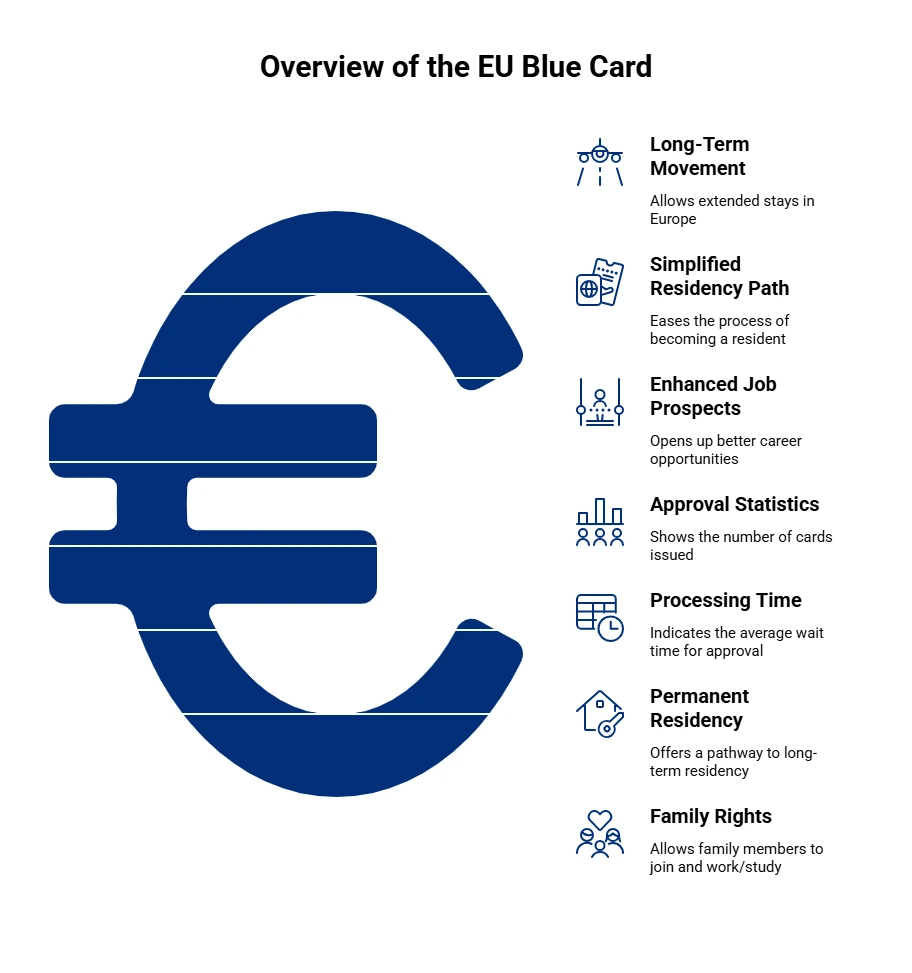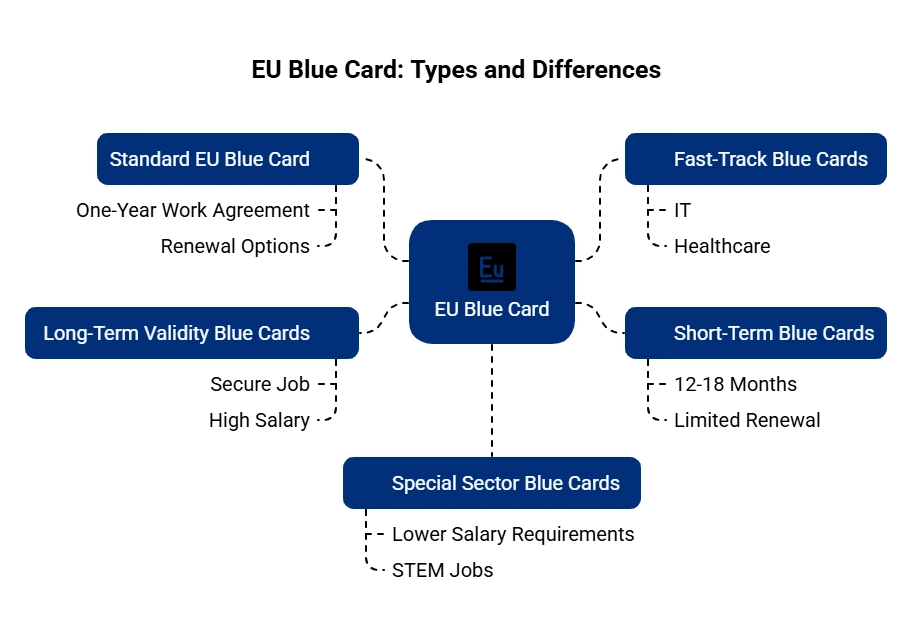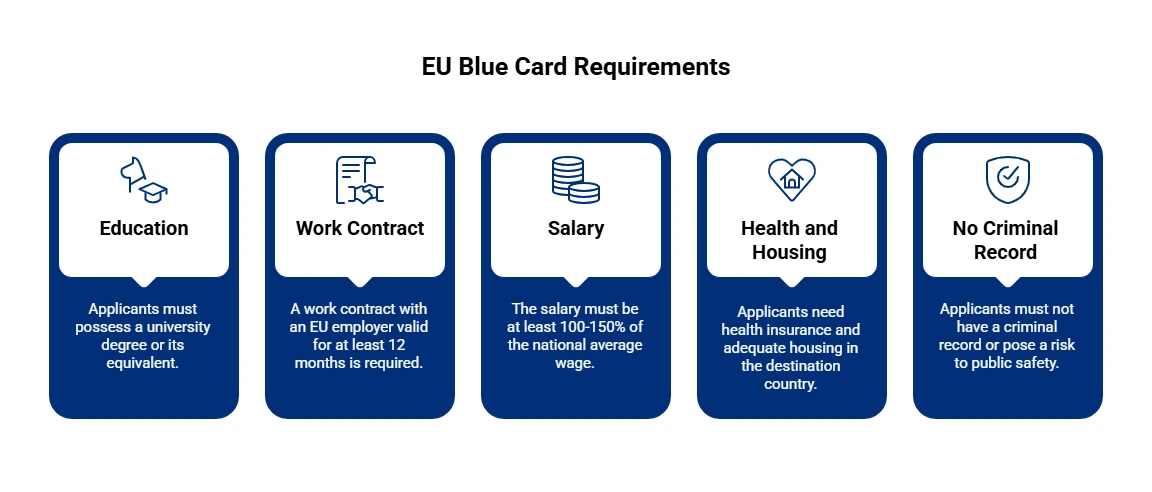The EU Blue Card lets skilled workers from the UK work and live legally in many European nations. It offers long-term movement, a simpler path to residency, and better job prospects.

The EU Blue Card is a special work-and-residence permit for highly qualified, non‑EU nationals. It permits you to live and work in 25 of the 27 EU countries (excluding Ireland and Denmark), helping fill critical shortages in sectors such as IT, engineering, healthcare, and research.
*Looking for guidance to apply for work overseas? Let Y-Axis guide you with the process.
The Blue Card provides several advantages, such as:
The EU Blue Card has a standard structure, but each member state has its own rules about:
Even though the EU Blue Card has an EU framework, how it's put into action changes a bit from country to country. Each member state sets its own rules for things like salary and how long the card is good for, but the main needs are generally the same.
Here's a simple breakdown of common types and differences:
Every EU country (except Ireland and Denmark) uses the Blue Card system within its own immigration setup. This means rules about salary, proof of housing, and how long it takes to bring your family over can be different.
If you are applying from the UK, be sure to check the specific rules of the country you want to move to.

Non-British citizens living in the UK with proper residency can apply if they meet these conditions:
British citizens cannot apply unless they also have citizenship in another eligible country.
*Want assistance to apply for migration overseas? Y-Axis is here to guide you with the process.
To qualify for EU Blue Card, applicants must have the following:
| Criteria | Requirement |
| Higher Education | University degree or equivalent qualification |
| Job Offer | Employment contract in an EU country for at least 6 months |
| Salary Threshold | Minimum 1.5× host country average gross salary (varies by country) |
| Clean Record | No criminal convictions or security issues |
| Passport Validity | Must be valid for at least 6 months beyond intended stay |

You must have the following documents while applying for the EU Blue Card:
| Document | Purpose |
| Valid Passport | Official identity and travel document |
| Employment Contract | Must meet salary threshold and duration conditions |
| Proof of Qualifications | Degrees or skill certificates |
| Health Insurance | Coverage in the EU country |
| Completed Application + Fee | Country-specific paperwork and payment receipt |
| Criminal Background Check | Required in some countries |
The process to apply for EU Blue Card is given below:
Step 1: Get a valid job offer from an EU employer that meets the salary threshold.
Step 2: Ensure you meet the eligibility criteria (degree, passport, no criminal record).
Step 3: Collect all required documents, including contract, qualifications, and insurance.
Step 4: Submit your application to the immigration authority of the host country.
Step 5: Attend a biometric appointment or interview, if required.
Step 6: Wait for approval (usually 1–3 months depending on the country).
Step 7: Receive your EU Blue Card and travel to the host country.
Step 8: Register your address locally and begin employment.
.webp)
| Country | Application Portal URL |
| Germany | [bluecard-eu.de] |
| France | [interieur.gouv.fr] |
| Netherlands | [ind.nl] |
| Austria | [migration.gv.at] |
| Sweden | [migrationsverket.se] |
Here are some of the benefits you can get with an EU Blue Card:
Detailed information about the costs and fees for an EU Blue Card is given below:
| Cost Component | Estimated Amount (EUR) |
| Application Fee | €100 – €140 |
| Residence Permit Card Issuance | €80 – €120 |
| Biometric Registration | Included or €10 – €30 |
| Translations & Certification | Varies |
| Renewal Fee (if applicable) | €80 – €120 |
Detailed information about the processing time for EU Blue Card is given below:
| Stage | Estimated Timeframe |
| Application Submission | 1 day |
| Application Review | 4 – 12 weeks |
| Biometric Appointment (if any) | Within 1 – 2 weeks of request |
| Decision Notification | Included in review time |
| Residence Card Issuance | 1 – 2 weeks after approval |
The validity, renewal, and mobility within the EU with the Blue Card is given below:
| Category | Details |
| Initial Validity | 1 to 4 years (varies by country and employment contract duration) |
| Renewal Eligibility | Renewable if employment continues and all criteria are still met |
| Renewal Frequency | Typically aligned with new contract periods or national rules |
| Mobility within EU | Allowed after 12 months in the first EU country (or 6 months in some cases) |
| Mobility Conditions | Must apply for a new Blue Card in the second country before relocating |
| Work Change Flexibility | Can change employer after 12–24 months with notification to authorities |
| Long-Term EU Residence | Eligible after 5 years (including Blue Card periods in different countries) |
The primary differences between EU Blue Card and other European Work Visas are given below:
| Feature | EU Blue Card | Other European Work Visas |
| Purpose | For highly skilled non-EU professionals | General work or sector-specific employment |
| Eligibility Criteria | University degree + job offer + salary threshold | Varies by country; may not require a degree |
| Minimum Salary Requirement | Yes (100%–150% of average national income) | Varies; often lower or not specified |
| Mobility Across EU | Yes, after 12–18 months in the first country | Usually limited to issuing country |
| Family Reunification | Fast-tracked with full work rights for dependents | Available, but often slower or with limited rights |
| Path to Permanent Residency | After 5 years (including time spent in other EU countries) | Varies by visa and country; often requires local continuity |
| Processing Time | 4–12 weeks on average | Varies widely; can be longer depending on the country |
| Recognition Across EU | Harmonised across most EU countries | Country-specific rules and recognition |
| Flexibility to Change Employer | Allowed with notification after initial period | Depends on national visa rules |
| Aimed at | Skilled professionals seeking EU-wide opportunities | Workers with offers in specific sectors or lower-skill roles |
After legally living in a country for 5 years with a Blue Card and having spent at least 2 years in the country where you are applying you can seek EU long-term resident status. Based on the country's regulations, you might qualify for citizenship sooner, mainly in countries that offer faster naturalization.
Your spouse or registered partner, along with your dependent children, is eligible to apply to join you. If their applications are approved, they will have the right to live, work, and study in the country. Please note that you may need to supply proof of adequate housing and means of support. In general, family reunification requests are processed together with the main application to make the transition easier.
Applications could be denied when:
Y-Axis helps UK residents apply for the EU Blue Card in their desired country by:
Explore what Global Citizens have to say about Y-Axis in shaping their future
Denmark Green Card Visa
Mrs.Khevna trivedi applied for Denmark G
Read More...
Pooja
Pooja provided us with great Y-Axis Revi
Read More...
Germany Job Seeker Visa
Y-Axis received excellent feedback from
Read More...
You are eligible for an EU Blue Card if you meet the following criteria:
The following EU member states currently offer the EU Blue Card:
Note: Ireland and Denmark do not participate in the EU Blue Card scheme. Each country applies its own salary thresholds and documentation requirements but adheres to the core framework of the EU Blue Card directive.
Both Germany and France actively support the EU Blue Card, but Germany is generally considered more accessible due to its lower salary threshold and higher number of issued Blue Cards. Germany also allows applicants with certain non-academic qualifications and experience in IT to qualify without a university degree. France, while welcoming, tends to have stricter salary requirements and processing times may vary by prefecture. Overall, Germany has a more streamlined and applicant-friendly approach, making it a preferred destination for many professionals seeking a Blue Card.
Yes, the EU Blue Card can lead to permanent residence in the issuing country. If you legally reside for 33 months with a Blue Card (or 21 months with B1-level language proficiency), you can apply for a permanent residence permit in countries like Germany. Additionally, after residing legally in the EU for five consecutive years, including at least two years in the current member state, you may qualify for an EU long-term residence permit. This offers more mobility and equal rights across the EU, such as access to education, work, and healthcare.
The EU Blue Card is a legal document issued to highly competent workers from outside the European Union and allows them to reside in any EU country and work. The highly qualified workers must have the following to be considered for an EU Blue Card:
Yes, EU Blue Card holders can bring their parents to a particular European country. But it is mandatory for the parents to meet the relevant conditions and lodge their applications at the same time as the primary EU Blue Card applicant to get residence permit.
The difference between an EU Blue Card and a PR is listed in the following table:
| EU Blue Card | Permanent Resident Permit |
| Temporary permit with a validity for a four years | Permanent permit with an indefinite period of validity |
| Can be used only in a particular EU country | Can be used in all European countries |
| Can apply for an EU Blue Card after living in the country for a short period of time, For example: Germany it is around 33 months | Can apply for an PR after living in the country for a long period of time, For example: Germany it is around 5 years |
It takes around three months to get an EU Blue Card. This might vary based on the selected European country and the information submitted at the immigration office.
EU Blue Card offers many benefits, and they are as follows:
You can apply for permanent residency in a European country after working for a period of 2 to 5 years.
If you have signed a minimum of 1 year employment contract, have tertiary education qualifications like a Master’s degree or diploma and an adequate health insurance are eligible to apply for an EU Blue Card in Poland.
It is mandatory to have a minimum income that is 1.5 times the German national annual average, which is around 58,400 EURO, to obtain an EU Blue Card. However, you can meet the lower income threshold of around 45 552 EURO for the following professions:
Around 24 European countries have issued the EU Blue Card. You can work in any of the following 24 countries:
Austria, Belgium, Bulgaria, Croatia, Cyprus, Czech Republic, Estonia, Finland, France, Germany, Greece, Hungary, Italy, Latvia, Lithuania, Luxembourg, Malta, Netherlands, Poland, Portugal, Romania, Slovakia, Slovenia, Spain and Sweden.
You cannot work in Ireland and Denmark with an EU Blue Card as they do not issue it.
The EU Blue Card is a permit that allows non-EU citizens with advanced skills to live and work in an EU nation. It targets professionals who hold a university degree and have secured a job in a high-skilled field. Candidates must meet the minimum salary requirement of the country where they plan to work. This card enables long-term residency, family relocation, and the chance to apply for permanent residency later on. It's suited for skilled people seeking jobs and the ability to move between EU countries. Most EU countries participate in this program, except for Ireland and Denmark.
Yes, you can bring your family on an EU Blue Card. Those holding an EU Blue Card can bring their spouse or registered partner and dependent children to live with them. Most countries allow families to reunite as soon as the Blue Card is valid. Usually, spouses can live and work in the host country without needing their own work permit. To do this, you'll need to show proof of your family relationship, where you will live, and that you can support them financially. This policy, which supports families, is a major benefit of the Blue Card. It lets your family fully integrate and have a stable life in Europe.
The EU Blue Card's first term is usually 1 to 4 years, which depends on the country and often matches your work contract. You can renew the card if you still meet the rules, like having a job and meeting the salary requirement. After living in the EU for five years straight, with time on the Blue Card in different countries included, you can apply for long-term EU residency or permanent residency in the country where you live, based on that country's laws.
Yes, you can change jobs with an EU Blue Card. In most countries, people must stay with their first employer for 12–24 months before switching jobs. After this, a change is allowed, but it usually requires notifying immigration or requesting an amendment. The new job should still meet Blue Card standards, like proper pay and needed skills. It's important that people review their host country's rules before making changes, since not following them can risk their ability to legally stay and work.
Yes, you can move to another EU Country with your valid Blue Card. The EU Blue Card provides mobility within the EU. International professionals can relocate to another participating country for work after living legally in their first EU country for 12 to 18 months. A new Blue Card application is required in the second country, but the process is simpler. The time spent in the first country counts toward long-term residency. This card works well for professionals wanting regional flexibility within the EU.
If you lose your job while holding an EU Blue Card in Germany, you must notify the immigration authority immediately. The Blue Card is tied to your employment, but German law allows a grace period of up to three months to find new work. During this time, you may remain legally in Germany, provided you continue to meet residence conditions. If you secure new employment within this period, you can keep your Blue Card, as long as the new position also meets Blue Card requirements, such as minimum salary thresholds and qualifications recognition.